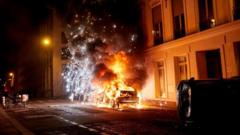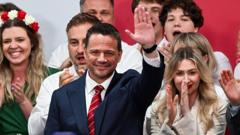The results raise concerns about domestic unrest and economic policy as Noboa embarks on a new term.
Ecuador's President Daniel Noboa Secures Re-election Amidst Controversy

Ecuador's President Daniel Noboa Secures Re-election Amidst Controversy
President Daniel Noboa's re-election highlights ongoing challenges with crime and political division in Ecuador.
President Daniel Noboa has successfully clinched re-election in Ecuador, solidifying his position for a full four-year term. His recent victory marks a pivotal moment for the sitting centre-right leader, who called the outcome "historic" after ascending to power in a snap election just months prior in November 2023. Noboa has garnered attention for his stringent military campaign against escalating gang violence, establishing Ecuador as one of the most perilous nations in South America.
His opponent, leftist candidate Luisa González, vocally rejected the election results, alleging fraud while failing to present any substantiating evidence for her claims. According to the Ecuadorian National Electoral Council, Noboa triumphed decisively with approximately 56% of the vote, a stark contrast to pre-election forecasts indicating a competitive match. "A victory of more than ten points and over one million votes leaves no ambiguity about the victor," Noboa asserted, crediting his team's unity and determination.
Noboa's continued presidency indicates a sustained mandate for his aggressive strategy against drug gangs, which involves increased militarization of public spaces and the construction of maximum-security prisons. His bold stance includes aspirations for foreign military support from the U.S. and European nations in combating crime, aiming to reconsider the constitutional ban on foreign military bases established under former President Rafael Correa, who is also the political mentor of González.
Despite a slight reduction in homicide rates during Noboa’s administration, violent incidents remain alarmingly high, with January witnessing over 780 murders — an ominous record. Public opinion polls reflected security concerns as a primary issue for voters, indicating that Noboa's next challenge lies in convincingly demonstrating the effectiveness of his policies against crime and unemployment, particularly after last year's dip in his approval ratings linked to severe droughts and energy shortages.
Seeking to diversify Ecuador’s energy resources, Noboa has proposed increased investments in renewable energy as a solution to a system largely reliant on hydropower. His intention to strengthen ties with the U.S. includes significant tariff changes on Mexican imports and revoking amnesty previously granted to undocumented Venezuelan migrants.
Noboa's campaign resonated with younger voters, focusing on job creation and modern communication strategies, along with commitments to bolster infrastructure and combat corruption. Following the electoral outcome, González accused authorities of undermining democracy and called for a recount, a process contingent upon her presenting evidence to substantiate her grievances. This tumultuous political landscape leaves Ecuador at a crossroads, posing challenges of unity and governance moving forward, particularly with lingering loyalties among González's supporters nostalgic for Correa’s era, a period viewed by many as a time of stability and economic growth.
In summary, Noboa's re-election secures continuity in leadership but underscores significant societal divisions while also challenging him to deliver on pressing issues, including safety and economic revitalization, throughout his new term.
His opponent, leftist candidate Luisa González, vocally rejected the election results, alleging fraud while failing to present any substantiating evidence for her claims. According to the Ecuadorian National Electoral Council, Noboa triumphed decisively with approximately 56% of the vote, a stark contrast to pre-election forecasts indicating a competitive match. "A victory of more than ten points and over one million votes leaves no ambiguity about the victor," Noboa asserted, crediting his team's unity and determination.
Noboa's continued presidency indicates a sustained mandate for his aggressive strategy against drug gangs, which involves increased militarization of public spaces and the construction of maximum-security prisons. His bold stance includes aspirations for foreign military support from the U.S. and European nations in combating crime, aiming to reconsider the constitutional ban on foreign military bases established under former President Rafael Correa, who is also the political mentor of González.
Despite a slight reduction in homicide rates during Noboa’s administration, violent incidents remain alarmingly high, with January witnessing over 780 murders — an ominous record. Public opinion polls reflected security concerns as a primary issue for voters, indicating that Noboa's next challenge lies in convincingly demonstrating the effectiveness of his policies against crime and unemployment, particularly after last year's dip in his approval ratings linked to severe droughts and energy shortages.
Seeking to diversify Ecuador’s energy resources, Noboa has proposed increased investments in renewable energy as a solution to a system largely reliant on hydropower. His intention to strengthen ties with the U.S. includes significant tariff changes on Mexican imports and revoking amnesty previously granted to undocumented Venezuelan migrants.
Noboa's campaign resonated with younger voters, focusing on job creation and modern communication strategies, along with commitments to bolster infrastructure and combat corruption. Following the electoral outcome, González accused authorities of undermining democracy and called for a recount, a process contingent upon her presenting evidence to substantiate her grievances. This tumultuous political landscape leaves Ecuador at a crossroads, posing challenges of unity and governance moving forward, particularly with lingering loyalties among González's supporters nostalgic for Correa’s era, a period viewed by many as a time of stability and economic growth.
In summary, Noboa's re-election secures continuity in leadership but underscores significant societal divisions while also challenging him to deliver on pressing issues, including safety and economic revitalization, throughout his new term.























